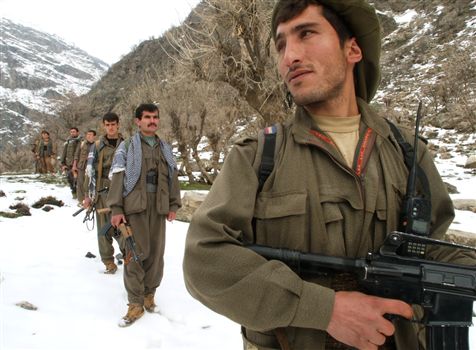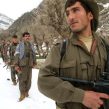
Kurds May Ask the PKK to Lay Down Its Arms
Publication: Eurasia Daily Monitor Volume: 6 Issue: 51
By:

The Kurdish Regional Government (KRG) in Iraq has prepared a proposal to end terror attacks inside Turkey by the Kurdistan Workers’ Party (PKK). It was first reported last December that the draft proposal included amnesty for PKK militants to return to Turkey and a provision for the Iraqi central government and the KRG to declare the PKK illegal (Taraf, December 12, 2008).
In February the plan was expedited, and the president of the KRG, Mesut Barzani, launched an effort to implement the arrangement to implement the arrangement. KRG representatives have been discussing the proposal with PKK leaders in the Kurdish region to convince them to lay down their arms. As part of the plan, the Turkish Armed Forces is continuing its operations against the PKK in order to put pressure on the organization, while the Justice and Development Party (AKP) government is preparing a procedure for granting amnesty to PKK militants who have not committed murder (Taraf, February 24).
The proposed plan has gained significant support in the public debates over the PKK. On March 11 Turkish President Abdullah Gul announced that "you will see important developments regarding the Kurdish questions" (Sabah, March 11). Immediately after this announcement, Abdullah Ocalan, the founder and imprisoned leader of the PKK, released a statement through his lawyers that he considered Gul’s announcement an important step and would be ready to help find a solution (ANF News Agency, March 13). Furthermore, the Kurdish government in northern Iraq is planning an International Kurdish Conference in April 2009 and has invited all Kurdish parties and groups from Iraq, Iran, Turkey, Syria, and the diaspora to discuss a possible solution for the Kurdish question in the region, particularly in Turkey. It is expected that the groups represented at the conference will call on the PKK to lay down its arms (Vatan, March 8).
The Turkish press speculates that during President Barack Obama’s visit to Ankara one of the issues that will be discussed is how to find a solution to the Kurdish question. It was reported that on the eve of U.S. Secretary of State Hillary Clinton’s visit to Turkey, three experts from the U.S. State Department and one from the U.S. embassy in Ankara met with Kurdish intellectuals in Ankara to discuss a possible solution to the situation of Turkey’s Kurds (Radikal, March 14).
Most recently, while attending the World Water Forum in Istanbul, Iraqi President Jalal Talabani met with Turkish Prime Minister Tayyip Erdogan to discuss regional issues including terrorism. It was reported that Talabani suggested that Turkey should grant amnesty to PKK militants who had not committed murder and allow the leaders of the PKK to seek political asylum in northern European countries (Hurriyet, March 16).
It seems that almost all political parties and international participants, including the United States, the European Union, Iran, Syria, Iraq, and Turkey, agree on the proposed plan to dismantle the PKK; but it is still unknown whether the PKK and its legal political wing, the Democratic Society Party (DTP), will participate in the international conference. Moreover, the plan does not seem to have taken the possible PKK reaction into account. DTP Chairman Ahmet Turk said that "the PKK should be involved in the discussions about solving the Kurdish question (www.yeniozgurpolitika.org, March 16). Ocalan announced that "all Kurdish groups may attend the International Kurdish Conference. One of the subjects that needs to be discussed at the conference is how to maintain the existing Kurdish armed forces [implying the PKK] as the defense forces of the Kurds" (ANF News Agency, March 13).
Cemil Bayik, the number two man after Murat Karayilan, who is the acting head of the PKK, calls this plan "an elimination plan" aimed at eradicating the PKK. Bayik summarized the U.S. position toward the Kurdish question as follows:
<wbr></wbr>
The substance of the U.S. policy toward Kurds is to maintain the Kurdish Regional Government as it is and separate the predominantly Kurdish city Kirkuk from the KRG; resistance forces in other parts of Kurdistan, i.e., Turkey, Syria and Iran, should be dismantled; colonialist powers [Iran, Turkey, Syria] should recognize the KRG and its status; and the KRG should respect the unity of the colonialist powers in the region (ANF News Agency, March 16).
Political observers are optimistic that the plan may end the decades of political violence. Given the fact, however, that the PKK leaders in their 30-year struggle against Turkey have gained political power and some level of legitimacy in the eyes of Kurdish nationalists, it will not be easy to convince them to renounce active terrorism, forfeit all they have gained, and live peacefully in northern Europe. Given the fact that all segments of Kurdish society, including the DTP, agree that armed conflict will no longer bring political benefits, it is expected that the Kurdish conference will issue a declaration calling on the PKK to abandon the use of arms. The leaders may nevertheless resist public pressure, even from the Kurdish community itself, in order to maintain the PKK as an armed guerilla group.




